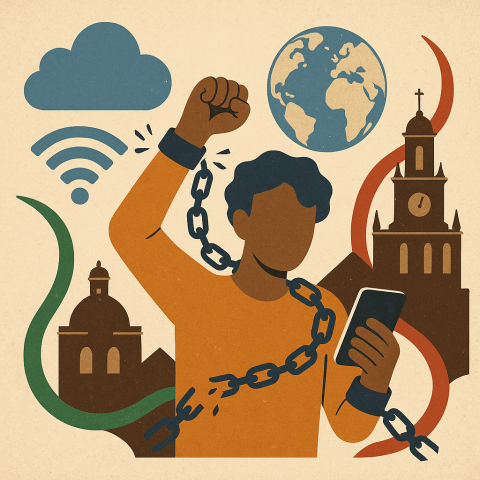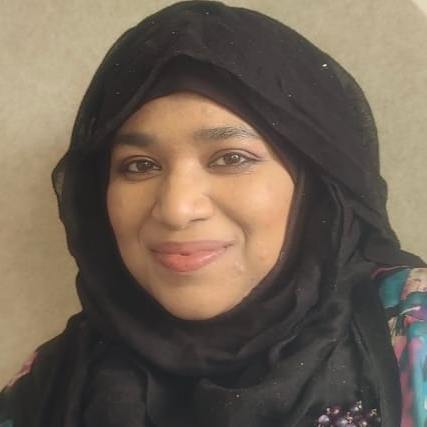
IAMCR is delighted to announce the winners of the 2025 Decolonising the Digital Award. This award recognises work that contributes to our understanding of the emerging global dynamics of digital politics, cultures, and infrastructures. It aims to identify modes of control and resistance, and ultimately, to challenge digital colonialism. The winners are:
- "Militant Mourning: Walking through Affective Archives," by Hoornaz Keshavarzian, Simon Fraser University (Canada)
- "Reclaiming Place Through Symbolic Geographies: Visual Resistance on Palestinian Instagram," by Insyirah Mujtahid, National University of Singapore, Nurul Huda Rashid, Leiden University (The Netherlands), Kokil Jaidka, National University of Singapore.
- "Towards a Decolonial AI in/for Africa: Critical Analysis on DataCapitalism, Epistemic Injustice, and Techno-Ethics," by Chikezie E. Uzuegbunam, Rhodes University (South Africa)
The awards will be formally presented at a special session during the IAMCR 2025 conference in Singapore.
Militant Mourning: Walking through Affective Archives
By Hoornaz Keshavarzian
Submitted to the Gender and Communication Section
Abstract
My paper offers a phenomenological account of feminist collectives that took shape in the aftermath of the Woman Life Freedom movement in Iran. These collectives aim to produce grassroots epistemes that go beyond the existing centralist, colonial, nationalist, neoliberal, and oriental hegemonies to better conceptualize the transnational feminist movements in the global south through an intersectional lens. By nuancing the plurality of the longstanding activism of women in the MENA region, these collectives offer a novel lexicon that takes account of the complexity of epistemic injustice. Emerging protests in the Middle East are “profoundly gendered” as women have historically paved the way for these movements (Al-Ali, 2023). As Hafez argues (2019, p. 39) “[a]ccounts and analysis of revolution remain androcentric at best, analyzing the events from a patriarchal vantage point that privileges the male gaze and normalizes masculine politics.” These collectives practice a politics of refusal through feminist archiving and counter-hegemonic knowledge production to subvert mainstream practices. By engaging in “intersectional anti-imperialist framework” (Moradian, 2022, p. 216), these collectives orient their dissent towards state oppression and hierarchical models of liberation, often exerted by western powers.

Hoornaz Keshavarzian is an Asper Graduate Fellow, CERi Fellow, PhD candidate and a sessional instructor in the School of Communication at Simon Fraser University. Her doctoral dissertation focuses on the intersection of feminist media studies and social movements. Her recent work has been published in Communication, Culture and Critique.
The Award Committee shared the following statement regarding Hoornaz's paper:
This paper offers a compelling fusion of critical scholarship, personal engagement, and decolonial methodology to theorize grief as political resistance. Drawing from the Iranian context of the Women, Life, Freedom movement, the author introduces the concept of “disruptive griefwork”, demonstrating how mourning becomes a site of affective solidarity, resistance, and agency against hegemonic power structures.
What sets this work apart is its deeply reflexive and participatory approach: the author is not merely a distant observer but an active participant in affective communication networks. The paper is rich in theoretical insight, drawing from regional cultures—Kurdish, Iranian, and Baloch—to reframe protest through the lens of embodied emotion and localized epistemologies. Its multimodal methodology, where text and images speak in tandem, vividly conveys the emotional and political weight of mourning practices.
Both conceptually and methodologically innovative, this is one of the most impactful papers submitted—rigorous, moving, and unmistakably aligned with the values of decolonial feminist scholarship. A standout candidate for the award.
Reclaiming Place Through Symbolic Geographies: Visual Resistance on Palestinian Instagram
By Insyirah Mujtahid, Nurul Huda Rashid, Kokil Jaidka
Submitted to the Visual Culture Working Group
Abstract
In an increasingly interconnected world, meaningful internet access remains a critical enabler of communication, social, economic, and cultural development, particularly for rural, remote, and marginalized Palestinians use Instagram to construct symbolic geographies that resist displacement and assert cultural presence. Analyzing 9,126 posts from 834 users posted between October 2023 – March 2024, we identify three recurring visual themes that serve as anchors of digital placemaking. The sharing of images depicting everyday routines and familiar spaces functions as an act of asserting belonging in the face of cartographic erasure. Resilience is conveyed through motifs of joy, family, and faith, symbolizing continuity under siege. Knowledge cultivation emerges through practices of naming places, traditions, and environmental markers, reinforcing cultural memory. Comparing Instagram content with 7,448 international news headlines, we find that user-generated posts often offer alternative framings that are absent in mainstream narratives. We close with a discussion of how Palestinian Instagram users created a networked archive that resists material destruction and algorithmic suppression, mapping threatened spaces and producing narrative coherence through everyday digital acts of documentation and resistance.

Insyirah Mujtahid is a Research Assistant in the Centre of Trusted Internet and Community at the National University of Singapore. She completed her Bachelor’s in Communications and New Media at NUS in 2023. Her research focuses on social media analysis, media representation, and audience engagement.

Nurul Huda Rashid is a postdoctoral researcher with Project 0100: Towards an Anthropology of Everyday AI in Islam, at Leiden University. Her research examines the algorithmic visuality of Muslim women images on global search engines through conjunctures of visual culture, critical gender and race studies, and AI and data studies.

Dr. Kokil Jaidka is an Assistant Professor at NUS. She investigates computer-mediated communication using computational models of language. Previously, she was a Presidential Postdoctoral Fellow at NTU and a Postdoctoral Fellow at the University of Pennsylvania. Her work appears in PNAS, Nature Human Behavior, and Journal of Communication.
In its evaluation, the Award Committee stated:
Drawing on the concepts of digital storytelling and visual placemaking, the paper offers a powerful analysis of Instagram-based narratives about Gaza. It develops the idea of symbolic geographies that challenge dominant algorithmic logics, contributing to an alternative, citizen-driven discourse. The authors engage with the concept of countervisuality to illustrate how visual media can resist erasure and mobilize solidarity during moments of crisis and violence.
Based on a rigorous and extensive study of Instagram accounts, the methodology is clearly articulated, and the findings are well-structured and insightful. The paper demonstrates significant research effort on a timely and politically urgent topic. While ethical considerations could be further addressed, the overall contribution is both compelling and impactful.
This is an exemplary piece of scholarship that resonates strongly with the themes of the award, particularly in advancing critical perspectives on visual culture, resistance, and digital activism. We consider it a strong candidate for recognition.
Towards a Decolonial AI in/for Africa: Critical Analysis on Data Capitalism, Epistemic Injustice, and Techno-Ethics
By Chikezie Uzuegbunam
Submitted to the Communication Policy and Technology Section
Abstract
This paper explores Artificial Intelligence (AI) in Africa through a decolonial theoretical lens, critically addressing how its development and deployment intersect with systemic inequalities and epistemic injustice. AI technologies promise to transform sectors like healthcare, education, and agriculture. However, they also perpetuate colonial legacies through data extraction, algorithmic bias, and the homogenisation of Africa’s socio-cultural diversity. But beyond AI’s perceived socio-economic benefits for African countries lie the socio-technical concerns about AI as a tool for perpetuating colonialism and historical inequalities. Thus, ‘AI colonialism’ is a term that stresses how the development and deployment of AI systems amplify, perpetuate, and instigate forms of domination and oppression characteristic of the colonial era. The term conceptually overlaps with ‘data capitalism’, portraying how data extraction can serve coloniality. Moving away from, but also related to data extraction and coloniality issues, are privacy, bias and discrimination, over-reliance, and usability concerns. These concerns have heightened academic discourse on AI decolonisation and prompted calls for related regulation, which is critically discussed in this paper. This paper examines the deployment of AI across several African countries through a decolonial lens, highlighting its implications for systemic inequality, epistemic justice, and ethical governance. Drawing on decolonial and anthropological perspectives, we critically engage with the contradictory potential of AI within the African context. The analysis incorporates examples from Mauritius, Egypt, South Africa, Tunisia, Ghana, Kenya, Nigeria, and Morocco, illustrating the opportunities and challenges of AI deployment across diverse socio-political and cultural landscapes. This paper is not an attempt to exhaustively unravel contentious AI decolonisation issues regarding Africa; rather, we recognise its imperfect but crucial contribution to the ongoing discourse on disassembling AI coloniality for a more equitable and connected world.
Chikezie E. Uzuegbunam is Deputy Head of School for Teaching and Research, Senior Lecturer, and MA Programme Coordinator at Rhodes University’s School of Journalism and Media Studies. He holds a PhD in Media Studies from the University of Cape Town. Dr. Uzuegbunam was a 2024/2025 Global Fellow at Northwestern University in Qatar, and has published extensively on digital sociology, children and youth, media and cultural studies, generative AI, and misinformation.

The following are the Award Committee’s remarks on this work:
This paper provides a rich and incisive conceptual analysis of Artificial Intelligence through the lens of decoloniality, drawing from African epistemologies to challenge dominant narratives in AI development and discourse. Though not empirical, the paper is grounded in compelling examples across African contexts and engages deeply with critical theory, including powerful critiques of data capitalism, epistemic injustice, and techno-ethics.
What makes this work particularly resonant is its interrogation of the very foundations of “intelligence” in AI systems—asking whose definitions are privileged and how these framings perpetuate historical divisions between the “desirable” and “undesirable.” It questions the erasures embedded in dominant AI discourses and highlights the need to foreground African intellectual traditions and ethical frameworks in shaping just technological futures.
Well-written, thoroughly researched, and conceptually bold, this paper stands out as a strong contender for the award and aligns closely with the themes of decolonisation, justice, and epistemic plurality.
Members of the Selection Committee
- Weiyu Zhang, Chair (National University of Singapore)
- Andrea Medrado (University of Exeter, UK)
- Benjamin Birkinbine (University of Nevada, Reno, USA)
- Claudia Padovani (University of Padova, Italy)
- Guy Hoskins (Carleton University, Canada)
- Julia Pohle (WZB Berlin Social Science Center, Germany)
- Leah Komen (Daystar University, Kenya)
- Usha Raman (University of Hyderabad, India)